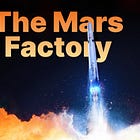The Ultimate Guidebook to Hard Problems
A founder's bucket list of hard problems with outsized impact.
Hard problems.
I can't stop thinking about them.
In fact, I wrote about 80% of an article that I had planned to publish today but I scrapped it in order to write this one because I wanted to kick of 2023 with something… bigger. Something that inspired.
Some people love the challenge of making money. They could be working on a boring, unsexy problem and be perfect happy knowing that they’re building a system that spits off cash like a money gun. But for others, the type of problem they’re working on counts for a lot. If you're one of those people, this article is for you.
For a few years, I've been collecting a list of the areas of innovation that are full of hard problems and would have an outsized impact on humanity.
This is that list.
As best as I could, I’ve included sub-categories, commentary and links to companies who are building in these spaces. This list is by no means finished, so if there’s an area of innovation or sub-category that you think should be on this list, please let me know in the comments below.
And most importantly, if you know an ambitious founder looking for their next thing, share this with them. Maybe they’ll find a hard problem that they can’t let go of, no matter how hard they try.
Welcome to Making Product Sense!
I’m Jacob, a product-focused founder in the trenches sharing product lessons from the best companies on the planet.
I’ve split the list up into three big buckets:
Basic Needs: food, water, shelter, healthcare, security, longevity etc.
Infrastructure: money, energy, manufacturing, supply chain, IoT etc.
Catalysts: AI/ML, 3D printing, synthetic biology, space, blockchain etc.
1. Basic Needs
In Maslow's Hierarchy of Needs, these are the things at the base of the pyramid. Without these things, the rest don't really matter because we’ll be too busy trying to survive. No one is thinking about artificial intelligence if they are fighting for every scrap of food or sip of clean water.
Despite the abundance that we find in large portions of the world, there are still people who struggle every day for the basic necessities of life. There’s plenty of work left to be done.
🥬 Food & 💧 Water
Sub-Categories
Clean Water (Charity:Water)
Sustainable Agriculture (Plenty)
Plant-based Meat (Impossible Foods)
Food Waste (Imperfect Foods)
Many millions of people don't have access to abundant food or clean water. In the developed world, it's easy to forget that we live on the same planet as human beings who are literally walking for hours a day to bring a few gallons of disease-ridden water back to their camp for their family. There are still enormous challenges to overcome in order to solve these issues of basic human survival.
🏥 Healthcare
Sub-categories
Personalized Medicine
Living Medicine (Synlogic)
Medical Robotics
AI-powered Drug Discovery (Exscientia)
Though it was unfortunately overshadowed by the release of ChatGPT, in early December of this year, scientists used base editing to perform a feat of biological engineering to design a 13-year old girl a “living drug” that would target her T-cell acute lymphoblastic leukemia.

Despite the abundant miracles of modern healthcare, much of it, including the system itself, is severely broken. There are so many needs from more personalized medicine, to new drug discovery, from insurance to high-end robotics.
🏡 Housing
Sub-categories
There are a lot of directions one could go with housing, from tackling homelessness to environmental impact. Needless to say, there's plenty of problems to be solved here.
👮🏽♂️ Security
Sub-categories
National Security (Anduril)
Disaster Response
Just as with our privacy, there's a great need for physical safety. Both national and personal defense is important to protecting the freedoms we all have to go about our lives without fear.
🔒 Privacy
Sub-categories
Identity Verification and Protection (Worldcoin)
Digital Authentication
The world is becoming more connected and data-driven than ever. Things that used to require an immense amount of manual labor are becoming simpler and more automated. But to do this well, it requires data. For a decade, we have shared intimate parts of our lives with the companies and systems that have promised to make our lives easier. But it's time that we begin to take back control of our personal information.
📚 Education
Sub-categories
Dynamic Curriculum
Education Access
Modern education is an incredibly complex web of delicate problems to be solved. Everything from scaling access to high-quality education to offering dynamic curriculum that can keep up with the rapid pace of discovery and creation.
👵🏽 Longevity
Sub-categories
Reversing Aging
Slowing Aging (Human Longevity)
If you look at the data that shows average lifespans over the years, it's incredible how far we've come. The quality of life we live at 80 years old would have been unthinkable a few hundred years ago. But each year, we're discovering more that we can do to slow (and eventually reverse) aging, cure (and eventually prevent) disease, and offer a higher quality of life for longer.
2. Infrastructure
These areas of innovation are the pipes and rails of modern life. The things that have a direct effect on the way we live. While they are full of innovations in their own right, their primary value is in the way the enable innovation in other industries.
💵 Money
Sub-categories
Lending
Investing
Cryptocurrency
If anything is central to the infrastructure of the world, our modern day financial system feels like it has a right to the throne. Money makes the world go round, right? But I think we can all agree there's much to be desired. From the ridiculous impossibility of getting a mortgage as a freelancer to the annoying complexities of sending money to your family overseas.
⚙️ Manufacturing
Sub-categories
Manufacturing Automation (Hadrian)
Personalized Manufacturing
Manufacturing has rapidly accelerated the global economy since the 1700's. Factories, assembly lines, and robotics completely shattered the rule book for the production of goods and it's no different today. Though the internet has increased the global GDP by 15%, manufacturing still accounts for 17%. After all, we still live in a physical world (for now 👀).
🔌 Energy
Sub-categories
Battery Technology (Tesla)
Nuclear Fusion (National Ignition Facility)
Renewable Energy
One of the most exciting scientific breakthroughs of my lifetime is the net gain nuclear fusion from the National Ignition Facility. And while it's more of a milestone than a commercially viable process for limitless clean energy, I'm more optimistic than ever for the future of sustainable energy.
🚀 Transportation
Sub-categories
The world has gotten so much smaller over the last 120 years. From personal travel to global supply chains, transportation is the backbone of the growing global economy. Without it, we would immediately jump backwards a hundred years. We would once again rely on our local communities to provide for our needs.
🚢 Supply Chain
Sub-categories
Supply Chain Automation
Last-mile Delivery
Freight Management (Flexport)
Perhaps this bleeds into the “Transportation” category a bit, but to me, there’s more nuance to it. Supply chain technology deals with more than just the transportation link in the chain. We’re talking about complex systems dealing with information across languages, currencies, cultures and political regimes. There’s no shortage of problems to be solved in this space. One only has to consider the Suez Canal blockage, the Chicago container backlog or the Port of Oakland cargo ship backlog in 2021 to know this is true.
📓 Knowledge Management
Sub-categories
As an avid note-taker and proponent of the “second brain” concept, personal knowledge management is a big part of my life. And for most folks who have ever Googled something, shareable knowledge is so ubiquitous that it’s often taken for granted (hello Wikipedia). But despite the power of internet publishing and search engines, there’s still a lot of work to be done in the global knowledge management space.
🕶 Virtual & Augmented Reality
Sub-categories
As I argued in this article, I believe that in 20 years, there’s a world in which people will spend more time in the metaverse than they currently spend sitting at their computers today. Entire immersive worlds will be available for exploration, commerce, entertainment and connection. But there are a multitude of problems to be solved before that’s a reality.
⌚️ Wearable Technology
Sub-categories
Tracking Technology
Augmentation Technology
Robotics
Wearable technology has come a long way since Steve Mann’s cyborg experiments of the 1990’s.
From Whoop’s health tracker to Level’s metabolic tracker, companies are pushing the boundaries of non-invasive wearable tech. What’s next?
📱 Internet-of-Things
Sub-categories
Connectivity
Internet-connected devices
Data Privacy/Security
In 2020, there were an estimated 38.5 billion connected devices in what is known as the “Internet of Things”. This is up from 13.4 billion in 2015; a rise of over 285%. As more and more “things” become part of this data- and internet-enabled world, there will be increasing challenges for privacy and security.
3. Catalysts
These areas of innovation are the sparks that set the world ablaze. They open doors to ideas that used to be impossibilities. They create entire industries.
Consider this tweet that illustrates the enormous rate of progress over the last 20 years. Some of the top companies in the world have only just emerged and that supersonic pace of innovation was spurred on by catalysts like the internet. The next 20 years? It's gonna be wild.
🧑🏼💻 Connectivity
Sub-categories
Internet Accessibility (Starlink)
Data Transfer Speeds
If transportation is the backbone of the physical world, connectivity is the backbone of the digital world. Bringing the rising billion online and ushering in new technologies like brain-machine interfaces are just a couple of the incredible challenges ahead.
💾 File Compression
Sub-categories
Compression Algorithms
AI-powered Data-Reconstruction
If you’ve seen the HBO show “Silicon Valley,” which I highly recommend, then you’ll get a very comical glimpse into the incredible power that file compression offers. More data can be stored per server, more data can be transferred on slower internet connections, the data itself can be transferred faster etc. It touches nearly every aspect of the internet economy.
🤖 Artificial Intelligence
Sub-categories
General AI (OpenAI)
Narrow AI
GPT-3 was cool. But GPT-4 is going to be useful. Over the next couple of years, I’m convinced that we will see incredible leaps in progress toward useful, general AI. As I explored in this article on Substack’s biggest opportunities, the applications for digital content creators will be immense. And that’s just the tip of the iceberg.
🔗 Blockchain
Sub-categories
Cryptocurrency
NFTs
Web 2.0 opened the door for online publishing. Social media, news outlets, newsletters, blogs… it unleashed the power of “publishing for the people.” But things that were unique like money, art, commerce… they had to jump through a lot of hoops to work with this new world. Blockchain technology brings the internet full circle. While it technically works, there are a lot of things left to build. We’re in the equivalent of the horse and buggy stage of blockchain and we need to build cars and trains.
🧱 Developer Tools
Sub-categories
No-Code
AI Code Assistants
GitHub’s Copilot, Replit’s Ghostwriter… programming has never been easier. And for those who aren’t ready to dive down the rabbit hole of writing code, there are no-code or low-code tools that let you wire up applications across the internet visually and build some incredible things. The creator economy is slowly bleeding out of content and into the world of software development.
🖨 3D Printing
Sub-categories
Material Science
New Applications (Relativity Space)
3D Printing Hardware
Additive manufacturing (vs. subtractive) brings a whole host of benefits. It reduces waste, the cost of prototyping, startup time, on-hand inventory, part reliability… the list could go on. In fact, it’s such a big leap in manufacturing that the folks at Relativity Space are 3D printing ~80% of the parts to build a rocket! Everything from organs for transplants to houses can be 3D printed… what’s next?
🦾 Robotics
Sub-categories
Computer Vision
Human-Machine Communication
Reasoning and Decision Making
Robots are semi-autonomous machines… tools with instructions. The beauty of a tool is that it’s able to work with incredible precision and reliability for the thing it was made to do. Robots add an additional layer of “intelligence” to the machine, enabling more flexibility in the work they can do. As more of our work is augmented by robots, more opportunities for creative exploration will appear.
🧠 Brain-Machine Interfaces
Sub-categories
When I consider which industry has the highest level of return AND the highest level of risk? BMI might take the cake. If you’re interested in a fun, easy-to-read dive into the future that Neuralink is trying to build, you should read this blog series by Tim Urban. They’re making rapid progress but the journey is long and hard.
🧬 Synthetic Biology
Sub-categories
Gene Sequencing (The Human Genome Project)
Genetic Engineering (Ginkgo Bioworks)
Synthetic biology is the field of science asking the question, “what if we could grow anything?” If that doesn’t get you excited, I don’t know what does. Synthetic biologists are exploring ways to grow cement, home materials, or even one day grow entire homes. What if we grew organisms that ate the plastic in our oceans? What if we grew our medicines in our gardens? The world’s most efficient manufacturing process (biological growth) would be available to us.
🪐 Space
Sub-categories
When you consider how little we know about our own planet, it can get a little overwhelming to consider how little we know about our universe. Entire planets, solar systems and galaxies are unexplored by mankind. Our periodic table might triple or quadruple in size! Our scarce resources might be more abundant than we know. Our creativity, in some ways, is bound by our inability to leave our little planet. So while it might be the last category in my list, it’s perhaps the one with the largest number of hard problems to be solved.
I realize this isn’t a traditional MPS article…
But I I see it as more of a cornerstone piece that sets the stage for future articles. The world is full of hard problems that we, as founders and product leaders, are tasked with solving. Know someone who’s looking for their next thing? Share it with them. With any luck, they’ll find a hard problem they were made to solve.
I don’t know about you, but when I read through these challenges, I get so excited to learn from the incredible companies who are building the future. If you want to follow along, hit subscribe to get product lessons from the world’s greatest companies in your inbox every Tuesday.
I wish you the best in 2023!
Happy New Year ✨
—Jacob ✌️
❤️ Smash that heart!
If you enjoyed this article, smash that heart icon to show some love! 🙏
















